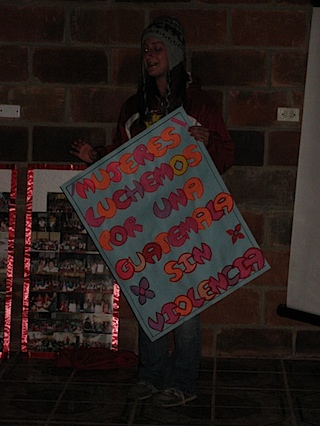Hello again, after another long absence. I’ve been busy, and I’ve been away. Most of last week I was just north of Huehuetenango (the city) helping facilitate a pretty exciting project that female volunteers in various parts of the world, including of course Guatemala, have begun as secondary projects. G.L.O.W. stands not for Gorgeous Ladies of Wrestling in this case, but Girls Leading Our World. It’s a 3-4 day camp, designed along the lines of an American-style summer camp. When I heard about this program during training, I knew I had to do it. The camp counselor in me wigged out with excitment.
GLOW was started by volunteers in Romania in 1995, and it is in Romania that GLOW has had the most success. At present the camp is run entirely by Romanian women who took part in the camp as girls. There is a GLOW organization that funds the program, as well as clubs similar to girl scout troops that get together the rest of the year and a GLOW website (in Romanian) for girls to visit, ask questions, and talk with other campers. The program is really well developed and very sustainable. That’s not quite the situation with GLOW in Guatemala.
 As I was told when I was appointed to the GLOW committee a month after swearing in, GLOW was something volunteers had wanted to do for years, but since we’re all only here for 2 years at a time, no one really knew how to get it going… until about 2 years ago when a very dedicated bunch of women asked for donations from the states and were determined to make it happen. The first camp was a success, but logistically very complicated and expensive. They paid bus fares for girls coming from all over the country to get to the central camping location, which meant there were ladinas and mayan girls from all different backgrounds at the camp. That in itself was fantastic, but the expense and hectic travel for the girls to get there was a bit much. The volunteers asked HCN’s to participate–Host Country Nationals, or Guatemalan women. There were HCNs who agreed to come, then didn’t show up, or only came for a few hours and left. The HCNs didn’t really understand the concept of the camp or the importance of the exercise as a whole. The volunteers learned that money spent on Domino’s pizza is not money well spent in Guatemala. Many Guatemalans are lactose intolerant, and for half the girls, pizza is more of a frightening concoction than a tasty treat.
As I was told when I was appointed to the GLOW committee a month after swearing in, GLOW was something volunteers had wanted to do for years, but since we’re all only here for 2 years at a time, no one really knew how to get it going… until about 2 years ago when a very dedicated bunch of women asked for donations from the states and were determined to make it happen. The first camp was a success, but logistically very complicated and expensive. They paid bus fares for girls coming from all over the country to get to the central camping location, which meant there were ladinas and mayan girls from all different backgrounds at the camp. That in itself was fantastic, but the expense and hectic travel for the girls to get there was a bit much. The volunteers asked HCN’s to participate–Host Country Nationals, or Guatemalan women. There were HCNs who agreed to come, then didn’t show up, or only came for a few hours and left. The HCNs didn’t really understand the concept of the camp or the importance of the exercise as a whole. The volunteers learned that money spent on Domino’s pizza is not money well spent in Guatemala. Many Guatemalans are lactose intolerant, and for half the girls, pizza is more of a frightening concoction than a tasty treat.
The second camp took place while I was still in training near Antigua. They decided to concentrate on bringing together girls from one area. The camp took place in Tecpan and was primarly attended by Kaqchikel girls. The volunteers said one of the coolest parts of the camp is that all the girls dressed in their nicest traje to come–you know, the traje reserved graduations and weddings. The participation from Guatemalan women was better. There was even a discussion panel of professional Guatemalan women for the girls to talk to. Each camp gave the GLOW committee enough success to remain hopeful and taught them lessons for improvement.
This camp was the third GLOW camp for Peace Corps Guatemala. The Peace Corps is an organization very concerned with sustainability, and after the third camp the original GLOW funds would be depleted or inadequate for another full size camp; therefore, the committee had to come up with a plan. We never intended for a year and half to go by without doing the third camp, but that’s how long it took us to find an aid organization interested in funding GLOW and to get committments from more Guatemalan women to help facilitate the camp. A volunteer who finished her service in November and two who will head home in March are credited with the leg work that led us to find Child Fund International, an organization that has satellite offices in most departments in Guatemala. Additionally, there are volunteers stationed near almost all of their offices to further facilitate cooperation between Peace Corps and CFI. CFI heard about the program, said it was great, and said they’d make GLOW part of their annual budget. YAY! The next camp was set to take place just north of Huehuetenango, heading up into the Cuchumatanes.
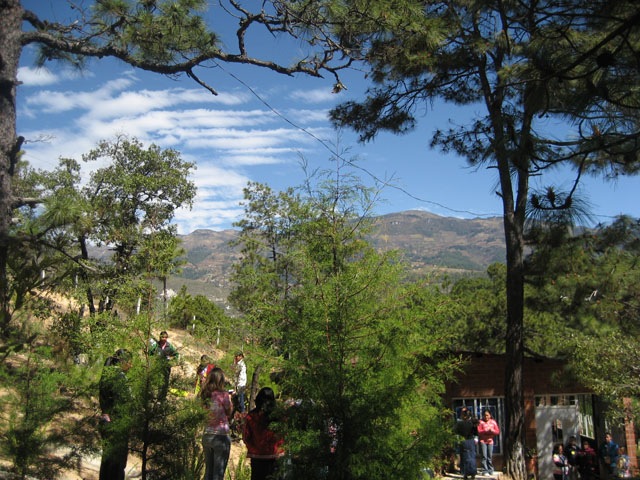
The volunteer who finished her service in November worked like crazy to have the camp before she left. Unfortunately, though, the CFI office in the area told us they were dedicated to hosting the camp, but interfered with the efforts by double booking their employee who was to oversee the camp. As things were being finalized for the camp on Nov 3-6, our volunteer was told that the woman who was to be present for the entire camp would not be present for any of it due to other work meetings. So much for better HCN participation or sustainability. The camp was then rescheduled three different times, until we were able to settle on the January dates and draw up a contract with the CFI office that they would not schedule their facilitator to be at other meetings during the duration of the camp. Por fin! Finally, we were ready to go.
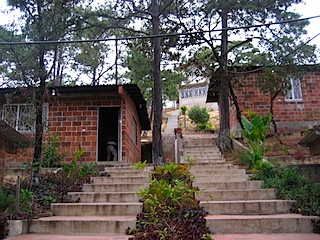 Ten volunteers–eco-tourism volunteers, municipal development volunteers, ag-marketing, youth development, healthy homes, and healthy schools volunteers– showed up on Sunday afternoon to head out to the camp where we would be staying in order to decorate and set things up for the following morning. The campground we stayed at is an Evangelical retreat center pretty much perfectly suited to our needs. There were multiple “cabins” (made out of concrete block) with two rooms and a large bathroom between the rooms, a meeting room, and a huge dining hall. The camp had cooks that were preparing all the meals for us. After all the set up, we headed back to our volunteer host’s apartment in the city where we finalized the schedule and decided who would be running each activity.
Ten volunteers–eco-tourism volunteers, municipal development volunteers, ag-marketing, youth development, healthy homes, and healthy schools volunteers– showed up on Sunday afternoon to head out to the camp where we would be staying in order to decorate and set things up for the following morning. The campground we stayed at is an Evangelical retreat center pretty much perfectly suited to our needs. There were multiple “cabins” (made out of concrete block) with two rooms and a large bathroom between the rooms, a meeting room, and a huge dining hall. The camp had cooks that were preparing all the meals for us. After all the set up, we headed back to our volunteer host’s apartment in the city where we finalized the schedule and decided who would be running each activity.
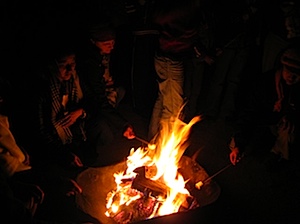 The girls showed up at the Oficina Municipal de la Mujer, the County Women’s Office, at 8 am to be transported out to the camp. And from there on out it ran like camp, the most significant difference being a focus on some pretty serious subjects. We did icebreakers and get-to-know you games. We tie-dyed shirts that say, “Estrellas de Hoy! Chiantla 2010”. GLOW doesn’t really translate, so we call it Stars of Today! We talked about self esteem: knowing our bodies and ourselves to have confidence in who we are. There was a workshop on the importance of setting goals. The girls decorated diary/notebooks to keep with them and write down anything that came to mind or was interesting to them. The first night, we had a bonfire and roasted marshmallows and made s’mores. Chiky cookies are graham cracker-like cookies with a chocolate coating, very popular here, and they totally make s’mores even easier to make than normal. They were a hit, and so was the fire because for the 4 days we were working on this camp Guatemala was having a cold spurt, and it was heinously chilly for most of the time there. I didn’t so much change clothes as put on a fresh base layer and put everything else back on again, including doubling tshirts, thermal shirts with sweaters, and a fleece on top. Yikes.
The girls showed up at the Oficina Municipal de la Mujer, the County Women’s Office, at 8 am to be transported out to the camp. And from there on out it ran like camp, the most significant difference being a focus on some pretty serious subjects. We did icebreakers and get-to-know you games. We tie-dyed shirts that say, “Estrellas de Hoy! Chiantla 2010”. GLOW doesn’t really translate, so we call it Stars of Today! We talked about self esteem: knowing our bodies and ourselves to have confidence in who we are. There was a workshop on the importance of setting goals. The girls decorated diary/notebooks to keep with them and write down anything that came to mind or was interesting to them. The first night, we had a bonfire and roasted marshmallows and made s’mores. Chiky cookies are graham cracker-like cookies with a chocolate coating, very popular here, and they totally make s’mores even easier to make than normal. They were a hit, and so was the fire because for the 4 days we were working on this camp Guatemala was having a cold spurt, and it was heinously chilly for most of the time there. I didn’t so much change clothes as put on a fresh base layer and put everything else back on again, including doubling tshirts, thermal shirts with sweaters, and a fleece on top. Yikes.
We had workshops on sexual health, HIV/AIDS awareness and prevention, family planning (as this ties in a lot here with developing goals and working to achieve them since so many girls have babies at such a young age), and nutrition and exercise. Being that I work with the Ministry of Health and know what services they offer and also that I work with women’s groups on a weekly basis, I co-facilitated a lot of the sex and sexual health workshops. It also helps that I’m married, because in this very conservative society even these teenage girls could think I only know these things because I’m a loose woman, to put it mildly. But I’m married, so obviously I can know these things and still be virtuous. The girls’ responses to the information were amazing. I feel like their frank and very specific questions were a sign that we’d succeeded in making them feel like this was a place of trust where they could get real information. There was a lot of dispelling rumors they heard in school. It was exciting. I even had ladies from the Women’s Office pulling me aside to ask questions about all the family planning information, which was really great.
Rosario was our greatest asset among the Guatemalan women who came and participated for the entire camp. She and her coworkers from the County Women’s Office facilitated a few workshops. Rosario was particularly fantastic in the planning and execution of the camp. She worked for the last two years alongside the volunteer who finished in November. The first time I met Rosario during a planning meeting, I thought she was older than I am. She’s so with it! It turns out, she just turned 21. She’s a full time employee at the Women’s Office, a full time student, and a new mom. She lost her brother in a drive-by shooting two years ago. She’s had a lot to deal with her in life, and still she’s got a ton of spunk and a desire to make things, all the things around her it seems, better. She and her coworkers talked about domestic violence and what women’s rights are in Guatemala, as the Women’s Office’s main job is to help women understand their rights and the services provided to them by the government. It’s an interesting job. In some places it seems the office is simply full of the mayor’s friend’s wives who aren’t really interested in doing a job per se, and in other areas it’s full of really fuerte women like Rosario who want to make a difference in their community. The domestic violence charla as well as their discussion on what rape is were really powerful for those of who knew that one of the girls attending the camp has a sister 7 months pregnant with their father’s baby. The social workers suspect the two of his daughters have now fathered his children, and the mother is too scared to report him. And she’s scared with reason. Just last month we heard a man across the valley from our village killed his wife because she reported him for the same crime. He spent two days in jail and was then let out. Teaching these girls what their rights are, and that they deserve these rights, was really powerful.
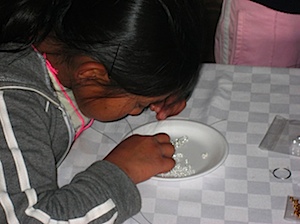 Rosario also brought in a friend of hers, a woman who’d started a side-business in jewelry making, and the friend was recruited to teach all of girls to make a jewelry set. This was to go along with a discussion about small business and the possibilities offered through micro-loans. It was a great idea. Realistically I think the girls were just thrilled they had not only tie dyed t-shirts to take home, but also a set of earrings, a necklace, and a bracelet they’d made on their own. They might have missed that it was supposed to be about possibilities for small businesses, but hey, they had a lot of information co ming at them.
Rosario also brought in a friend of hers, a woman who’d started a side-business in jewelry making, and the friend was recruited to teach all of girls to make a jewelry set. This was to go along with a discussion about small business and the possibilities offered through micro-loans. It was a great idea. Realistically I think the girls were just thrilled they had not only tie dyed t-shirts to take home, but also a set of earrings, a necklace, and a bracelet they’d made on their own. They might have missed that it was supposed to be about possibilities for small businesses, but hey, they had a lot of information co ming at them.
On the last night Rosario gave a presentation on civic participation and leadership. She and her coworkers talked about corruption and how no matter how many people try to bribe you, the ballots are secret, so no one will ever know if their bribes worked. This is funny, because it’s true. You can accept all the bribes you want from candidates, but they’ll never know if you voted for them or not. Corruption is a huge deal here. As the UN committee on impunity found in their first report six months after arriving in country, Guatemala is so deeply sunk in corruption at all levels of government that the country is incapable of dealing with the problem on its own. Rosario talked to the girls at length about examining each candidate’s platforms and voting for the person you think is best for the job. She also went through all the steps to register to vote. Next year is a presidential election year, and there were quite a few girls between 17 and 19 present. To me, sitting in on this talk was rather amazing. I was never pulled into a workshop that explicitly told me how to deal with corruption in my government. Not to say it doesn’t exist in the US (*cough* Blagojevich!), but it’s not the dire problem it is here. And usually if the folks are caught in the US, they are punished.
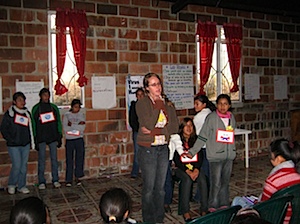 To drill home the point of conscientious voting, Rosario had nominated four of us volunteers as representatives of made-up political parties with ridiculous names. We had to make up our own platforms. The girls were supposed to exercise their right to vote on whichever candidate they thought was best. We had a good time making up our mayoral platforms and giving the speeches. One of the parties promised to pave all the roads from the farthest rural communities into the county seat–which was very apropos, since two of the girls spent six hours on a bus coming in from the most rural aldea of Chiantla in order to attend the camp. One of the parties promised to fight domestic violence that destroys families, saying that strong families make strong communities. I was next up, promising to make sure our health center and posts were always stocked with the necessary medications, vitamins and vaccines as well as beginning an educational campaign for parents regarding family health. The last and most dynamic candidate of us all promised to build a beautiful central park with fountains and drinking fountains, even dog fountains, and a theater where we could all enjoy the premiere of Romeo and Juliet. She had the crowd chanting her party name, CHIN-BON-BIN! CHIN-BON-BIN! CHIN-BON-BIN! at 3 different times throughout her rousing speech. It was fantastic. This particular volunteer was an actress with Second City in Chicago and then for a time in LA before joining the Peace Corps. She is unsuspectingly hilarious at times. Mayor in Spanish is alcalde, but a female mayor is an alcaldesa. We were all tense during the elections, and I felt that Chin-bon-bin had a pretty good chance of winning. But once the votes were in, I came out the victor and was hitherto addressed as Alcaldesa Fanjoy. The thing about the name Fanjoy is that it’s rare enough in English, but in Spanish they pronounce it Fan-Hoy. Hilarious. It’s probable I will be addressed as Alcaldesa Fan-hoy for a very long time by one friend or another.
To drill home the point of conscientious voting, Rosario had nominated four of us volunteers as representatives of made-up political parties with ridiculous names. We had to make up our own platforms. The girls were supposed to exercise their right to vote on whichever candidate they thought was best. We had a good time making up our mayoral platforms and giving the speeches. One of the parties promised to pave all the roads from the farthest rural communities into the county seat–which was very apropos, since two of the girls spent six hours on a bus coming in from the most rural aldea of Chiantla in order to attend the camp. One of the parties promised to fight domestic violence that destroys families, saying that strong families make strong communities. I was next up, promising to make sure our health center and posts were always stocked with the necessary medications, vitamins and vaccines as well as beginning an educational campaign for parents regarding family health. The last and most dynamic candidate of us all promised to build a beautiful central park with fountains and drinking fountains, even dog fountains, and a theater where we could all enjoy the premiere of Romeo and Juliet. She had the crowd chanting her party name, CHIN-BON-BIN! CHIN-BON-BIN! CHIN-BON-BIN! at 3 different times throughout her rousing speech. It was fantastic. This particular volunteer was an actress with Second City in Chicago and then for a time in LA before joining the Peace Corps. She is unsuspectingly hilarious at times. Mayor in Spanish is alcalde, but a female mayor is an alcaldesa. We were all tense during the elections, and I felt that Chin-bon-bin had a pretty good chance of winning. But once the votes were in, I came out the victor and was hitherto addressed as Alcaldesa Fanjoy. The thing about the name Fanjoy is that it’s rare enough in English, but in Spanish they pronounce it Fan-Hoy. Hilarious. It’s probable I will be addressed as Alcaldesa Fan-hoy for a very long time by one friend or another.
Following our funny campaign, one of the volunteers who’s a little less than a year into her service gave a presentation to highlight civic participation in an everyday way. Lake Atitlán, one of the most famous tourist stops in Guatemala along with the Mayan ruins of Tikal, is in serious danger. Aldeous Huxley declared the site one of the most beautiful places on earth, and it really is breathtaking. The lake, 10 miles across at its widest point and home to 3 volcanos, has been the center of the Mayan villages that surround it for thousands of years, but the population has grown considerably and the volume of tourist traffic there is often immense. In the last 60-70 years, it seems everyone has been transfixed by its beauty while being rather careless with the way they treat it. Raw sewage and garbage, gas from all the boat taxis, and chemical fertilizer runoffs from the steep cultivated slopes running down into the water have reached unbearable levels.
Lake Atitlán is normally deep blue in the morning and evening, bright blue during the day, or grey blue when the rainy season storms blow in. But in October, it turned green with a massive algae bloom feeding off all the lake toxicity. It’s a big problem. It threatens indigenous populations that have fished there for centuries, as the bloom will choke out the fish if it gets big enough (and it will if it goes untreated). It threatens the economy of the entire area, now so heavily dependent on tourist traffic. One of our fellow volunteers gave a presentation on the gravity of the situation and what has to happen to keep the lake from dying. She explained how the newly formed organization Todos por el Lago, Everyone for the Lake, operates, with community representatives showing up at formal meetings in central locations and taking the messages back to their communities, how everyone from poor indigenous fishermen to McDonalds are pitching in to make sure the lake isn’t destroyed. At present the blooms are seasonal, but they’ve reached as deep as 30 meters under the surface of the lake. The volunteer was so passionate, and I think all of us learned something from her talk.
I think her situation is one of those great moments of serendipity or fate or destiny, or whatever you want to call it, in life. She was placed in a lake town as a community tourism volunteer shortly before the bloom presented itself, but she’s got a masters in environmental science with a concentration in fecal water contamination. Now she’s changing her job to deal solely with issues of the lake. She’s already helped write a grant to fund the first testing lab on the lake, so samples don’t have to be schlepped to Guate or sent abroad for testing. It was a ten minute presentation, but it was great for its urgency and how well it illustrated what citizens should do for their country. But this was a rather heavy way to end the night, so we broke away from all the seriousness with our crazy dance-a-thon talent show.
The last day of camp, the girls had time to ask questions and clarify anything they were confused about. Then they were asked to make Action Plans. What are they going to do when they go back to their communities to share the information they’ve received? They all chose different activities, gave dates and times. The plan, at the moment, is for the Women’s Office and their local PCV to follow up on the girls and their activities as well as support them if/when they need it.
We all spread out and talked to the girls over lunch. They talked about how it felt so good to identify with different facilitators, their attitudes and passions. I asked some of them what sort of things they learned, and most of them agreed that they’d heard of most of these things before, but vaguely. They were all appreciative that they’d been given the opportunity to learn about these things so in depth, “not like in school” they said. Whoa.
It occ urred to me, as I was giving talks during different sessions and sitting with the girls at meal time talking, I thought it very ironic that there were MANY sessions and conversations that wouldn’t have been allowed to take place in a lot, if not most, schools and summer camps in the United States. Here the information is just as taboo, but there are no laws to prevent discussing these things (think “abstinence-only sex education”). At summer camp in the US, counselors are told very explicitly what they can and can not discuss with campers. It’s a BIG deal. The difference, I think, is that in the US the information is there, guarded by the adults, held in libraries, searchable on the internet. Any kid who really wants to know things has resources to find them out, including adults who can talk to them if asked. Here, the resources just aren’t available, and the adults are not guardians of information–they too lack information on health, sex, sexuality, civic participation, self-esteem, and women’s rights.
urred to me, as I was giving talks during different sessions and sitting with the girls at meal time talking, I thought it very ironic that there were MANY sessions and conversations that wouldn’t have been allowed to take place in a lot, if not most, schools and summer camps in the United States. Here the information is just as taboo, but there are no laws to prevent discussing these things (think “abstinence-only sex education”). At summer camp in the US, counselors are told very explicitly what they can and can not discuss with campers. It’s a BIG deal. The difference, I think, is that in the US the information is there, guarded by the adults, held in libraries, searchable on the internet. Any kid who really wants to know things has resources to find them out, including adults who can talk to them if asked. Here, the resources just aren’t available, and the adults are not guardians of information–they too lack information on health, sex, sexuality, civic participation, self-esteem, and women’s rights.
I’m convinced that without all the days, weeks, and summers I spent at Girl Scout Camp, I would’ve turned out a totally different person. I gained basics like self-esteem and teamwork, and well as my dreams to study abroad after meeting so many foreign counselors from my time at camp. Foreign counselors sparked my interests in other places and people, and a constant drive to (as the pledge says) “serve God* and my country; to help people at all times, and to live by the Girl Scout Law.” It’s been such a positive influence in my life, I was convinced that GLOW has the same potential. Now that I was finally able to participate in a camp here, I know it’s true. You put a bunch of energetic and determined women and girls in a room, all with different interests and backgrounds, and everyone is bound to have a good time and walk away a little smarter. I love girl time! Don’t get me wrong, I do like boys, a lot. I married one. But wouldn’t you know I also found him at Girl Scout Camp? No joke. 🙂 Anyway, it was one rewarding week, doing my job here in what felt like the most dynamic environment I’ve worked in during all of Peace Corps. I have a lot of hope for GLOW in Guatemala, and for the next six months I’ll be working as support where needed to convince others of the validity of the program and working always toward the big “S”, SUSTAINABILITY.
For more information on how GLOW is going and growing worldwide you can Google GLOW, Peace Corps. Pretty interesting stuff.
* The word “God” can be interpreted in a number of ways, depending on one’s spiritual beliefs. When reciting the Girl Scout Promise, it is okay to replace the word “God” with whatever word your spiritual beliefs dictate.
